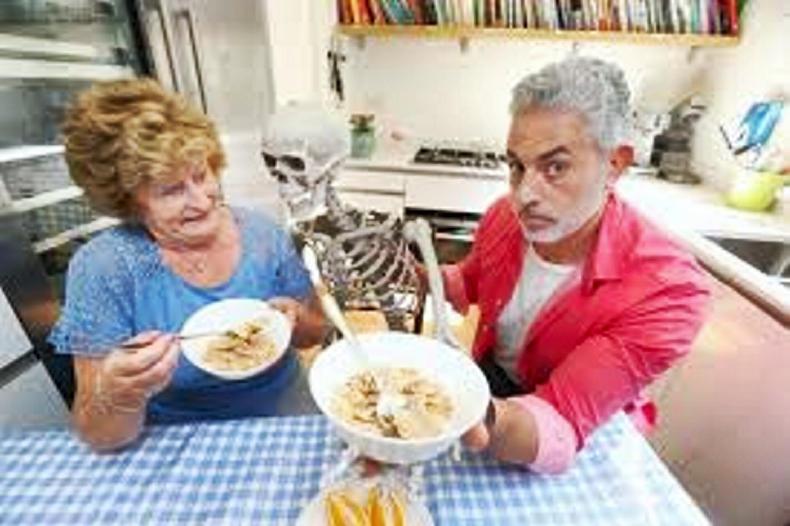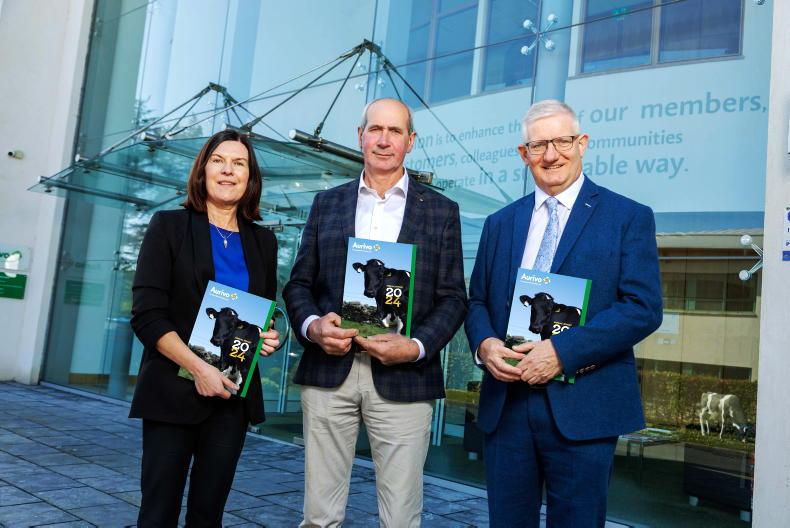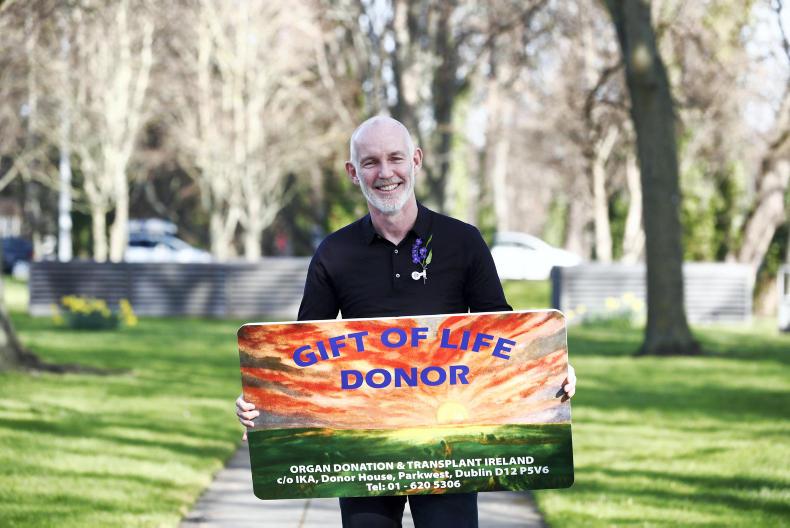Mór milk
Connacht Gold has launched an enriched fresh whole milk for growing children aged one to 12 years. It is called Mór Milk and has no artificial flavours or added sugar. It is also fortified with iron, prebiotic fibre, vitamins A, D3, E, C and chicory root fibre.
Dr Nina Byrnes, nutritional ambassador for the Connacht Gold brand, says: “Connacht Gold Mór Milk contains some of the main building blocks for nutrition. One of its key benefits is its high iron content. Many parents don’t realise how much iron children over 12 months need. Low iron levels can have an impact on a child’s growth and may lead to behavioural problems.”
Connacht Gold Mór Milk is available in supermarkets. RRP is €1.65.

Mór Milk.
Easolief duo
A new pain relief tablet, Easolief Duo, which combines paracetamol and ibruprofen, is now available over the counter (OTC) in pharmacies without prescription. The patented formulation combines the two drugs – 500mg of paracetamol and 150mg of ibuprofen – and Clonmel Healthcare, the manufacturers, say that the tablets provide 30% more pain relief than the same daily dose of paracetamol or ibuprofen alone. As it is codeine free, they also believe that Easolief Duo will provide a new option for those who would prefer not to take codeine-based painkillers.
See www.easoliefduo.ie for more information.

Easolief Duo.
Baz and Nancy Ashmawy focus on osteoporosis
Dishes for Density is the name of the campaign fronted by Baz and Nancy Ashmawy to educate Irish people on the foods they need in their diet to improve bone health.
Foods like dairy, oily fish and broccoli are good for our bones but in a recent survey funded by Amgen, it was shown that many people are unclear about what foods keep their bones strong.
In an era when there is a trend among some people to turn to non-dairy substitutes rather than consume calcium-rich dairy products, the president of the Irish Osteoporosis Society, Professor Moira O’Brien, believes that this campaign is timely.
“It couldn’t have come at a better time given this trend. Ireland is also a country renowned for its changeable weather and particularly during the winter months many people in Ireland are not exposed to sunlight. This can lead to vitamin D deficiency so it is vital that the Irish public maintain a regular intake of vitamin D and calcium through their diet all year round.”
See www.irishosteoporosis.ie

Dishes for Density - Baz and Nancy Ashmawy.
Teagasc mental health leaflet
Teagasc has published a new leaflet, Positive Mental Health in Farming, available at www.teagasc.ie/publications. It focuses on stress prevention and the importance of health checks and a balanced lifestyle in supporting physical and mental health. The value of good working and personal relationships is highlighted too, as well as maintaining strong contact with family, friends and fellow farmers.
West Cork mental health and wellbeing service
A new mobile mental health and wellbeing service, Wellbeing Network, for communities in west Cork, will visit up to two communities in the area a month. The aim is to get rural areas talking about mental health. If you would like the Wellbeing Network to host an event in your area of west Cork, email Kathleen.harrington@nln.ie. See www.thewellbeingnetwork.ie for more info.
Pieta House opens in Wexford
Pieta House has now opened a service in 14 Francis Street, Wexford town. It offers a free, professional counselling service to those who are feeling suicidal or are self-harming. Counselling is also offered to families who are suicide bereaved. A 24-hour helpline (1800 247 247) operated by qualified therapists is available seven days a week, 365 days a year. Alternatively, to arrange an appointment, contact 053-91-22787 (9am-5pm). Pieta house can also be contacted by texting HELP to 51444. For more info, email mary@pieta.ie or visit www.pieta.ie
Chairs can kill
Metabolism slows down by 90% after just 30 minutes of sitting, the Irish Heart Foundation says, so we have to get up often and move.
Sitting for too long – and the average Irish person sits for 7.3 hours a day – is bad news for our health because when our metabolisms slow down, this affects our bodies’ ability to break down body fat and also to regulate blood sugar and blood sugar levels. Prolonged sitting doubles the risk of heart attack or stroke, the Irish Heart Foundation says. That’s why we should remember that CHAIRS CAN KILL. See www.chairscankill.ie to calculate your sitting time and get tips to get moving.
Here are some tips for office workers to incorporate more movement into your day from Kos Ergonomics.ie:
1 Try to leave your desk every 30-45 minutes.
2 Do some of your tasks standing up.
3 Walk to people’s desks instead of emailing them.
4 Talk the stairs instead of the lift – these little bursts of movement help.
5 Go for a walk at break and lunch times.
How to avoid back-to-school germs
Schools can be a common breeding ground for germs so how do you reduce your child’s risk of illness this winter? Effective hand washing is one of the most important tools in preventing many illnesses, says the Public Health Agency in NI. Parents and schools can help by encouraging good personal hygiene by encouraging children to:
Carry tissues.Wash hands thoroughly with soap and warm water before eating and after using the toilet.Teach children not to share drinks, food or lip balm.Teach them to cover their nose and mouth when coughing and sneezing and dispose of the tissue quickly and carefully in a bin.Use alcohol-based hand gel or wipe, eg on field trips.Osteoporosis
Following last week’s feature on osteoporosis in Irish Country Living, we received alot of feedback, with more queries on Mairead Lavery’s prognosis, recovery and costs. Mairead answers these queries here.
Forsteo is an expensive drug but the maximum I pay is €134 per month. A DXA scan costs €110 on average. The cost of bloods depends on where they are done as not all hospitals do all the tests and it also depends on whether or not you are on social welfare.
18 months after starting medication I was back for more blood tests and another DXA scan a few weeks ago. And really the results couldn’t have been much better. Instead of being deep in the red zone, I was midways into the yellow zone, which means I had gone from severe osteoporosis to mild to moderate osteopenia – the forerunner to osteoporosis. I couldn’t believe my eyes.
Vitamin D and calcium levels were in great shape and cortisol levels were way down and under control. I’m on Forsteo for another six months and I’ve also started a twice-a-year injection of Prolia, a bone retention medication. If I keep with the programme for another six months there is no reason why I shouldn’t be in the green zone by the middle of next year.
Lots of women from around the country have contacted me about their own diagnosis of osteoporosis since I first wrote about this over a year ago. They are told osteoporosis is not reversible.
Speaking for myself, with the evidence of DXA scans and an extensive suite of blood tests, osteoporosis is reversible in certain cases, especially if its origin is lifestyle related. In other cases, people can significantly improve their bone health. Osteoporosis is not something women of any age should be told to “live with”. Thanks to Professor O’Brien, hopefully it’s something I won’t have to do.
Cappagh Hospital and NDC
The National Dairy Council, in association with Cappagh Hospital Foundation, has launched an awareness campaign to educate consumers on the importance of bone health through the life stages.
TV presenter Mark Cagney developed bone density issues at the age of 46.
“I had the bone density of a woman in her 80s – that was a T score of minus 2.5. I was told that with the right treatment, diet and exercise this would be reversed in about three years. The treatment worked wonderfully and my last DXA scan results were a plus 2.5 T score.
See www.mindyourbones.ie for more information about other bone conditions and for tips and advice from Cappagh surgeons.

Mark Cagney: Mind Your Bones awareness campaign.
Mór milk
Connacht Gold has launched an enriched fresh whole milk for growing children aged one to 12 years. It is called Mór Milk and has no artificial flavours or added sugar. It is also fortified with iron, prebiotic fibre, vitamins A, D3, E, C and chicory root fibre.
Dr Nina Byrnes, nutritional ambassador for the Connacht Gold brand, says: “Connacht Gold Mór Milk contains some of the main building blocks for nutrition. One of its key benefits is its high iron content. Many parents don’t realise how much iron children over 12 months need. Low iron levels can have an impact on a child’s growth and may lead to behavioural problems.”
Connacht Gold Mór Milk is available in supermarkets. RRP is €1.65.

Mór Milk.
Easolief duo
A new pain relief tablet, Easolief Duo, which combines paracetamol and ibruprofen, is now available over the counter (OTC) in pharmacies without prescription. The patented formulation combines the two drugs – 500mg of paracetamol and 150mg of ibuprofen – and Clonmel Healthcare, the manufacturers, say that the tablets provide 30% more pain relief than the same daily dose of paracetamol or ibuprofen alone. As it is codeine free, they also believe that Easolief Duo will provide a new option for those who would prefer not to take codeine-based painkillers.
See www.easoliefduo.ie for more information.

Easolief Duo.
Baz and Nancy Ashmawy focus on osteoporosis
Dishes for Density is the name of the campaign fronted by Baz and Nancy Ashmawy to educate Irish people on the foods they need in their diet to improve bone health.
Foods like dairy, oily fish and broccoli are good for our bones but in a recent survey funded by Amgen, it was shown that many people are unclear about what foods keep their bones strong.
In an era when there is a trend among some people to turn to non-dairy substitutes rather than consume calcium-rich dairy products, the president of the Irish Osteoporosis Society, Professor Moira O’Brien, believes that this campaign is timely.
“It couldn’t have come at a better time given this trend. Ireland is also a country renowned for its changeable weather and particularly during the winter months many people in Ireland are not exposed to sunlight. This can lead to vitamin D deficiency so it is vital that the Irish public maintain a regular intake of vitamin D and calcium through their diet all year round.”
See www.irishosteoporosis.ie

Dishes for Density - Baz and Nancy Ashmawy.
Teagasc mental health leaflet
Teagasc has published a new leaflet, Positive Mental Health in Farming, available at www.teagasc.ie/publications. It focuses on stress prevention and the importance of health checks and a balanced lifestyle in supporting physical and mental health. The value of good working and personal relationships is highlighted too, as well as maintaining strong contact with family, friends and fellow farmers.
West Cork mental health and wellbeing service
A new mobile mental health and wellbeing service, Wellbeing Network, for communities in west Cork, will visit up to two communities in the area a month. The aim is to get rural areas talking about mental health. If you would like the Wellbeing Network to host an event in your area of west Cork, email Kathleen.harrington@nln.ie. See www.thewellbeingnetwork.ie for more info.
Pieta House opens in Wexford
Pieta House has now opened a service in 14 Francis Street, Wexford town. It offers a free, professional counselling service to those who are feeling suicidal or are self-harming. Counselling is also offered to families who are suicide bereaved. A 24-hour helpline (1800 247 247) operated by qualified therapists is available seven days a week, 365 days a year. Alternatively, to arrange an appointment, contact 053-91-22787 (9am-5pm). Pieta house can also be contacted by texting HELP to 51444. For more info, email mary@pieta.ie or visit www.pieta.ie
Chairs can kill
Metabolism slows down by 90% after just 30 minutes of sitting, the Irish Heart Foundation says, so we have to get up often and move.
Sitting for too long – and the average Irish person sits for 7.3 hours a day – is bad news for our health because when our metabolisms slow down, this affects our bodies’ ability to break down body fat and also to regulate blood sugar and blood sugar levels. Prolonged sitting doubles the risk of heart attack or stroke, the Irish Heart Foundation says. That’s why we should remember that CHAIRS CAN KILL. See www.chairscankill.ie to calculate your sitting time and get tips to get moving.
Here are some tips for office workers to incorporate more movement into your day from Kos Ergonomics.ie:
1 Try to leave your desk every 30-45 minutes.
2 Do some of your tasks standing up.
3 Walk to people’s desks instead of emailing them.
4 Talk the stairs instead of the lift – these little bursts of movement help.
5 Go for a walk at break and lunch times.
How to avoid back-to-school germs
Schools can be a common breeding ground for germs so how do you reduce your child’s risk of illness this winter? Effective hand washing is one of the most important tools in preventing many illnesses, says the Public Health Agency in NI. Parents and schools can help by encouraging good personal hygiene by encouraging children to:
Carry tissues.Wash hands thoroughly with soap and warm water before eating and after using the toilet.Teach children not to share drinks, food or lip balm.Teach them to cover their nose and mouth when coughing and sneezing and dispose of the tissue quickly and carefully in a bin.Use alcohol-based hand gel or wipe, eg on field trips.Osteoporosis
Following last week’s feature on osteoporosis in Irish Country Living, we received alot of feedback, with more queries on Mairead Lavery’s prognosis, recovery and costs. Mairead answers these queries here.
Forsteo is an expensive drug but the maximum I pay is €134 per month. A DXA scan costs €110 on average. The cost of bloods depends on where they are done as not all hospitals do all the tests and it also depends on whether or not you are on social welfare.
18 months after starting medication I was back for more blood tests and another DXA scan a few weeks ago. And really the results couldn’t have been much better. Instead of being deep in the red zone, I was midways into the yellow zone, which means I had gone from severe osteoporosis to mild to moderate osteopenia – the forerunner to osteoporosis. I couldn’t believe my eyes.
Vitamin D and calcium levels were in great shape and cortisol levels were way down and under control. I’m on Forsteo for another six months and I’ve also started a twice-a-year injection of Prolia, a bone retention medication. If I keep with the programme for another six months there is no reason why I shouldn’t be in the green zone by the middle of next year.
Lots of women from around the country have contacted me about their own diagnosis of osteoporosis since I first wrote about this over a year ago. They are told osteoporosis is not reversible.
Speaking for myself, with the evidence of DXA scans and an extensive suite of blood tests, osteoporosis is reversible in certain cases, especially if its origin is lifestyle related. In other cases, people can significantly improve their bone health. Osteoporosis is not something women of any age should be told to “live with”. Thanks to Professor O’Brien, hopefully it’s something I won’t have to do.
Cappagh Hospital and NDC
The National Dairy Council, in association with Cappagh Hospital Foundation, has launched an awareness campaign to educate consumers on the importance of bone health through the life stages.
TV presenter Mark Cagney developed bone density issues at the age of 46.
“I had the bone density of a woman in her 80s – that was a T score of minus 2.5. I was told that with the right treatment, diet and exercise this would be reversed in about three years. The treatment worked wonderfully and my last DXA scan results were a plus 2.5 T score.
See www.mindyourbones.ie for more information about other bone conditions and for tips and advice from Cappagh surgeons.

Mark Cagney: Mind Your Bones awareness campaign.













SHARING OPTIONS